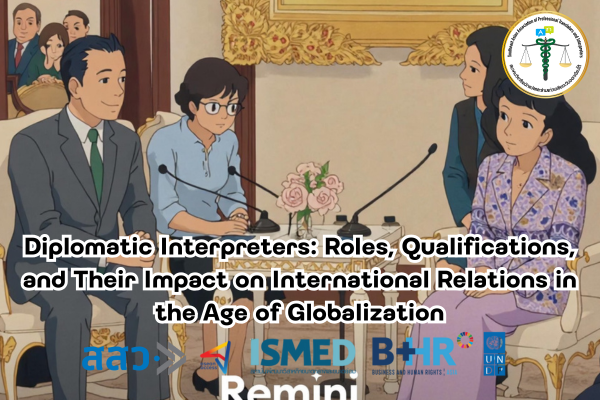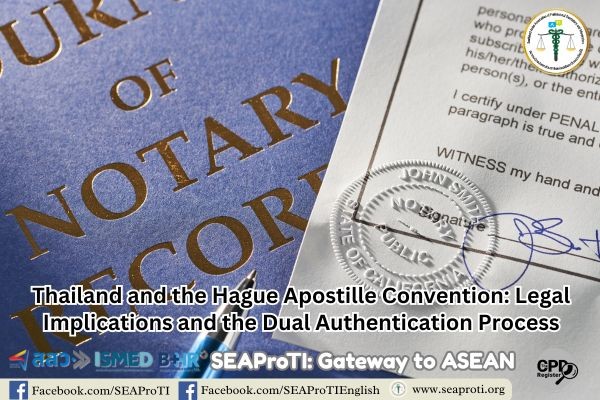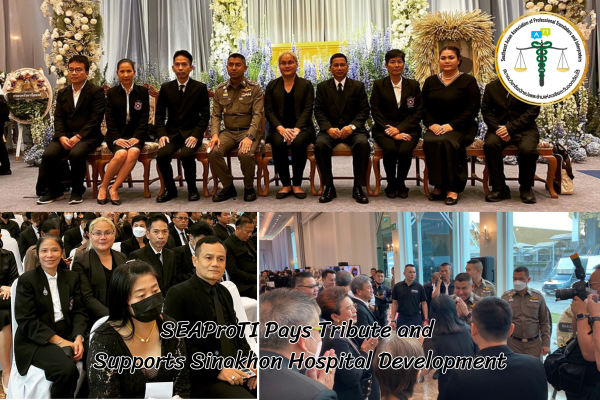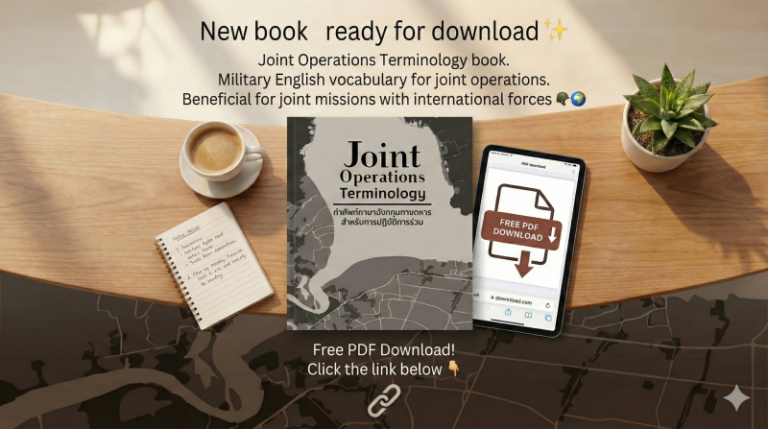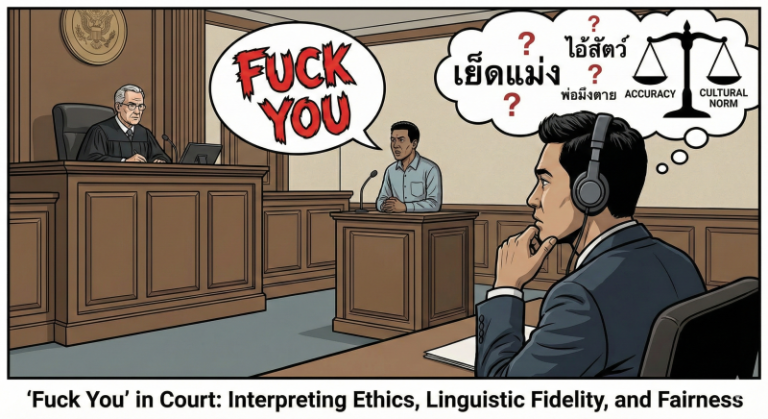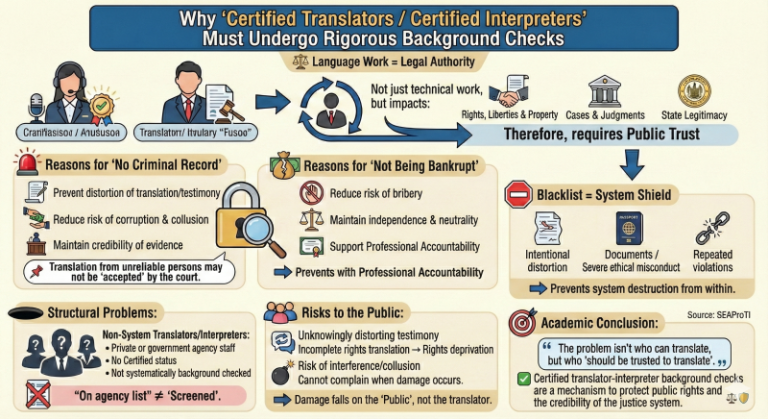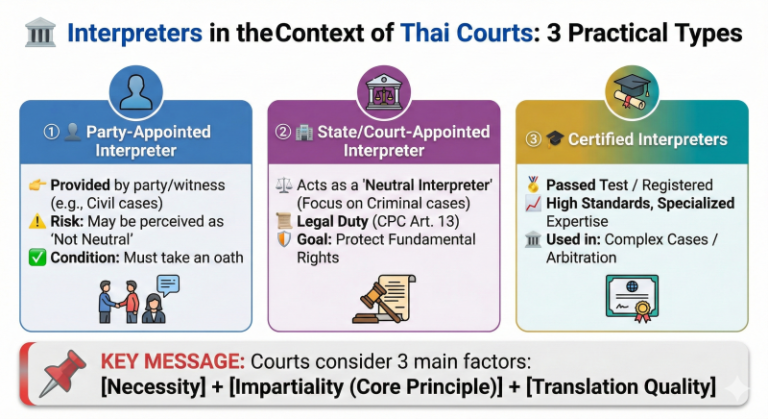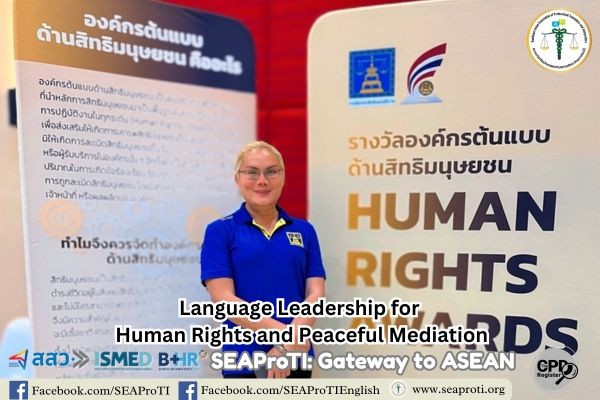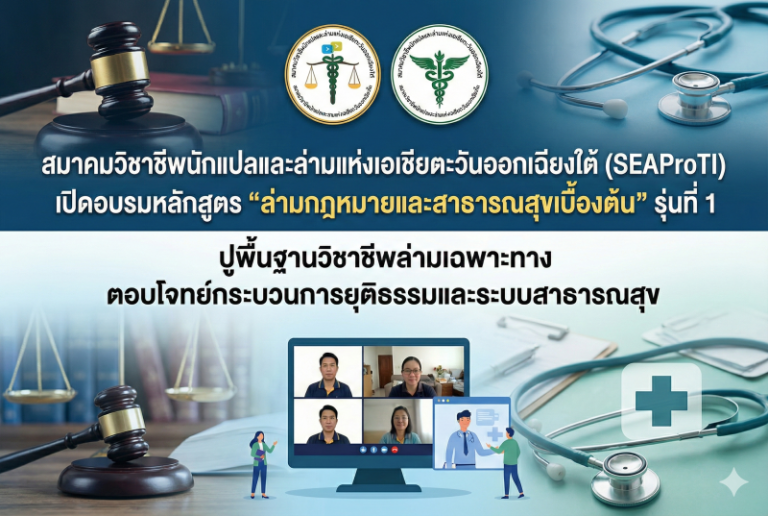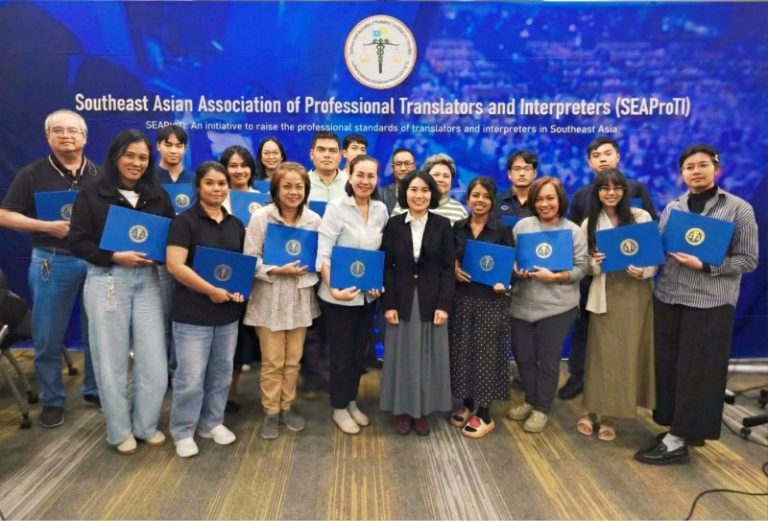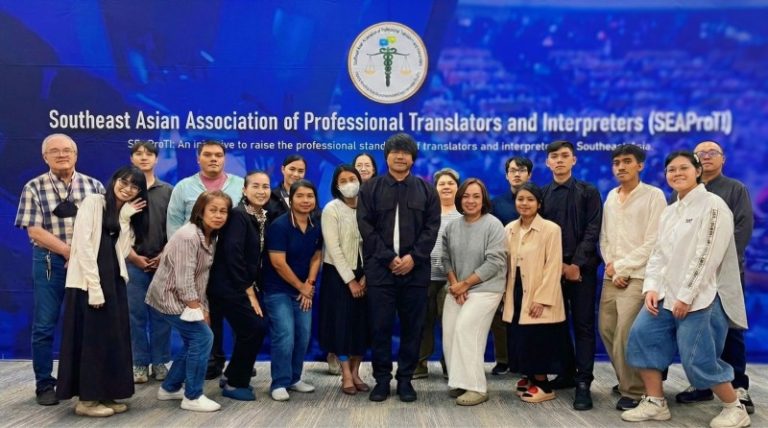Diplomatic Interpreters: Roles, Qualifications, and Their Impact on International Relations in the Age of Globalization
5 June 2025, Bangkok – Diplomatic interpreters are highly specialized professionals whose roles are indispensable to the conduct of international relations. In diplomatic contexts, successful communication depends not only on linguistic accuracy but also on the interpreter’s ability to convey intent, tone, and cultural context. This is particularly vital in negotiations, high-level meetings, and cross-border diplomatic communications where every nuance can affect bilateral or multilateral outcomes.
The responsibilities of diplomatic interpreters extend far beyond the confines of a summit room. Their work encompasses bilateral negotiations, press conferences, multilateral forums, and the translation of official documents, policy papers, and intergovernmental correspondence. Each task demands the highest levels of linguistic precision, cultural awareness, and confidentiality.
Professionally, diplomatic interpreters must possess near-native fluency in at least two languages, most commonly including English and another language relevant to international diplomacy. They are also expected to have a thorough understanding of intercultural dynamics, diplomatic etiquette, and the broader geopolitical context in which their interpretation occurs. Analytical skills and the ability to assess the subtext of diplomatic discourse are crucial to their effectiveness.
From a qualifications standpoint, interpreters in diplomatic settings typically hold advanced degrees in interpreting, translation, linguistics, or international relations. They also undergo specialized training in simultaneous and consecutive interpreting techniques and must meet rigorous professional standards. Recognition and certification from reputable professional associations, such as the International Association of Conference Interpreters (AIIC) or regional bodies like the Southeast Asian Association of Professional Translators and Interpreters (SEAProTI), are regarded as important indicators of competence and credibility.
Engaging interpreters certified by SEAProTI for diplomatic missions offers several advantages. First, these interpreters are trained to handle high-pressure situations such as intergovernmental negotiations, crisis communication, and conflict mediation, where both linguistic precision and emotional composure are critical. Second, SEAProTI emphasizes strict professional ethics and confidentiality, aligning with the sensitivities of diplomatic work. Third, SEAProTI interpreters often have in-depth knowledge of the ASEAN region—an area marked by its cultural diversity and complex political dynamics, which gives them a strategic edge in interpreting regional diplomatic affairs with accuracy and contextual insight.
At the policy level, integrating SEAProTI-certified interpreters into national diplomatic processes minimizes the risk of miscommunication while enhancing transparency, credibility, and mutual understanding in international forums. Diplomatic interpreters should not be viewed merely as language conduits; they are cultural and communicative bridges who contribute directly to the effectiveness of diplomacy.
In conclusion, diplomatic interpreters are a critical component of international engagement in today’s interconnected world. Their expertise not only ensures accurate cross-cultural communication but also serves as a strategic asset that strengthens a nation’s presence and credibility in global diplomacy. The use of interpreters certified by reputable professional bodies such as SEAProTI represents an investment in diplomatic precision, trust, and long-term international cooperation.
SEAProTI’s certified translators, translation certification providers, and certified interpreters:
The Southeast Asian Association of Professional Translators and Interpreters (SEAProTI) has officially announced the criteria and qualifications for individuals to register as “Certified Translators,” “Translation Certification Providers,” and “Certified Interpreters” under the association’s regulations. These guidelines are detailed in Sections 9 and 10 of the Royal Thai Government Gazette, issued by the Secretariat of the Cabinet under the Office of the Prime Minister of the Kingdom of Thailand, dated July 25, 2024, Volume 141, Part 66 Ng, Page 100.
To read the full publication, visit: the Royal Thai Government Gazette
ล่ามทูต: บทบาท คุณสมบัติ และอิทธิพลต่อความสัมพันธ์ระหว่างประเทศในยุคโลกาภิวัตน์
5 มิถุนายน 2568, กรุงเทพมหานคร – ล่ามทูต (Diplomatic Interpreters) เป็นกลุ่มผู้เชี่ยวชาญทางภาษาและวัฒนธรรมที่มีบทบาทสำคัญยิ่งต่อความสัมพันธ์ระหว่างประเทศ โดยเฉพาะในบริบทของการเจรจาทางการทูตที่ต้องอาศัยความเข้าใจอย่างลึกซึ้งทั้งในด้านถ้อยคำ เจตนา และบริบททางวัฒนธรรม การถ่ายทอดสารในระดับนี้ไม่ใช่เพียงการแปลภาษา หากแต่เป็นการสื่อสารที่ครอบคลุมมิติทางการเมือง การทูต และความสัมพันธ์ระหว่างรัฐอย่างรอบด้าน
บทบาทของล่ามทูตไม่ได้จำกัดอยู่เพียงในห้องประชุมระหว่างผู้นำประเทศเท่านั้น หากยังครอบคลุมไปถึงกิจกรรมหลากหลาย เช่น การเจรจาระดับเจ้าหน้าที่ การแถลงข่าวร่วม การประชุมพหุภาคีในเวทีระหว่างประเทศ ตลอดจนการแปลเอกสารนโยบายและการติดต่อราชการระหว่างรัฐ ซึ่งล้วนต้องการความแม่นยำทางภาษาสูงสุดและความสามารถในการรักษาความลับในระดับที่เคร่งครัด
ในทางปฏิบัติ ล่ามทูตจำเป็นต้องมีความสามารถทางภาษาระดับใกล้เคียงเจ้าของภาษาอย่างน้อยสองภาษา โดยทั่วไปมักรวมถึงภาษาอังกฤษและภาษาที่เกี่ยวข้องกับพันธกิจด้านการต่างประเทศ นอกจากนั้นยังต้องมีความรู้ความเข้าใจเกี่ยวกับวัฒนธรรมระหว่างประเทศ ธรรมเนียมทางการทูต และแนวคิดทางภูมิรัฐศาสตร์ รวมถึงต้องสามารถวิเคราะห์ข้อมูลเชิงลึกเกี่ยวกับบริบทของคู่เจรจาและสถานการณ์ระหว่างประเทศได้อย่างมีประสิทธิภาพ
คุณสมบัติทางวิชาชีพของล่ามทูตในระดับมาตรฐานสากลมักประกอบด้วยการศึกษาในระดับบัณฑิตศึกษาหรือสูงกว่าในสาขาการแปล การล่าม หรือความสัมพันธ์ระหว่างประเทศ ควบคู่กับการฝึกอบรมเฉพาะทางด้านเทคนิคการล่าม เช่น การล่ามแบบพร้อมกันและล่ามต่อเนื่อง อีกทั้งต้องผ่านการรับรองจากองค์กรวิชาชีพที่ได้รับการยอมรับ เช่น สมาคมนักแปลและล่ามระหว่างประเทศ (AIIC) หรือองค์กรในระดับภูมิภาค เช่น สมาคมวิชาชีพนักแปลและล่ามแห่งเอเชียตะวันออกเฉียงใต้ (SEAProTI)
การใช้ล่ามที่ผ่านการรับรองจาก SEAProTI โดยเฉพาะในภารกิจด้านการทูต มีข้อได้เปรียบหลายประการ ประการแรก ล่ามเหล่านี้ได้รับการฝึกอบรมด้านการล่ามในสถานการณ์ที่มีแรงกดดันสูง เช่น การประชุมระหว่างรัฐ การไกล่เกลี่ยความขัดแย้ง หรือการสื่อสารในช่วงวิกฤต ซึ่งต้องใช้ทั้งความสามารถทางภาษาที่แม่นยำและการควบคุมอารมณ์อย่างมืออาชีพ ประการที่สอง SEAProTI ให้ความสำคัญกับจรรยาบรรณวิชาชีพและการรักษาความลับของข้อมูล ซึ่งเป็นหัวใจของงานล่ามทูต ประการสุดท้าย ล่ามของ SEAProTI มักมีความรู้คู่กับประสบการณ์ตรงในบริบทอาเซียน ซึ่งเป็นภูมิภาคที่มีความหลากหลายทางวัฒนธรรมและการเมืองสูง จึงมีศักยภาพในการถ่ายทอดสารอย่างสอดคล้องกับบริบททางภูมิรัฐศาสตร์ได้ดีกว่าล่ามทั่วไป
ในระดับนโยบาย การบูรณาการล่ามทูตที่มีคุณสมบัติตามมาตรฐานของ SEAProTI เข้ากับกระบวนการทางการทูตของรัฐ ไม่เพียงแต่ช่วยลดความเสี่ยงจากความคลาดเคลื่อนทางภาษา หากยังเสริมสร้างความน่าเชื่อถือ ความโปร่งใส และความเข้าใจอันดีในเวทีระหว่างประเทศ ทั้งนี้ ล่ามทูตไม่ควรถูกมองเพียงในฐานะ “ผู้แปล” หากแต่เป็นผู้มีบทบาทในการสร้างสะพานทางการสื่อสารและวัฒนธรรมระหว่างประเทศอย่างแท้จริง
กล่าวโดยสรุป ล่ามทูตเป็นฟันเฟืองสำคัญของระบบความสัมพันธ์ระหว่างประเทศในยุคที่การสื่อสารข้ามภาษาและวัฒนธรรมมีผลกระทบต่อความมั่นคงทางการเมือง เศรษฐกิจ และความร่วมมือระหว่างรัฐอย่างลึกซึ้ง ความเชี่ยวชาญของล่ามที่ผ่านการรับรองจากองค์กรวิชาชีพ เช่น SEAProTI จึงไม่ใช่เพียงการรับประกันคุณภาพของการสื่อสาร หากยังเป็นปัจจัยเชิงยุทธศาสตร์ที่สามารถเสริมความแข็งแกร่งให้กับบทบาทของรัฐในเวทีโลกได้อย่างยั่งยืน
เกี่ยวกับนักแปลรับรอง ผู้รับรองการแปล และล่ามรับรองของสมาคมวิชาชีพนักแปลและล่ามแห่งเอเชียตะวันออกเฉียงใต้
สมาคมวิชาชีพนักแปลและล่ามแห่งเอเชียตะวันออกเฉียงใต้ (SEAProTI) ได้ประกาศหลักเกณฑ์และคุณสมบัติผู้ที่ขึ้นทะเบียนเป็น “นักแปลรับรอง (Certified Translators) และผู้รับรองการแปล (Translation Certification Providers) และล่ามรับรอง (Certified Interpreters)” ของสมาคม หมวดที่ 9 และหมวดที่ 10 ในราชกิจจานุเบกษา ของสำนักเลขาธิการคณะรัฐมนตรี ในสำนักนายกรัฐมนตรี แห่งราชอาณาจักรไทย ลงวันที่ 25 ก.ค. 2567 เล่มที่ 141 ตอนที่ 66 ง หน้า 100 อ่านฉบับเต็มได้ที่: นักแปลรับรอง ผู้รับรองการแปล และล่ามรับรอง


